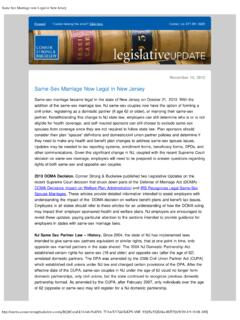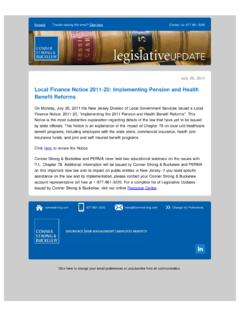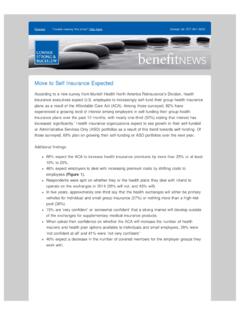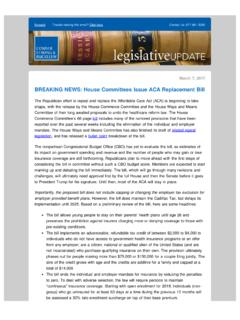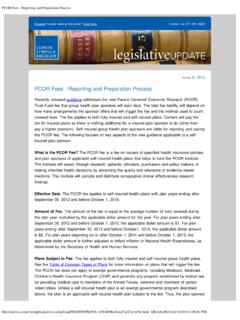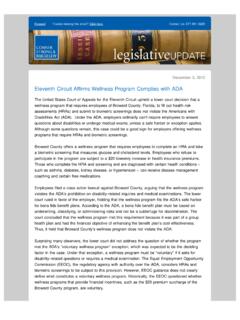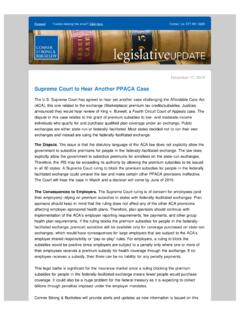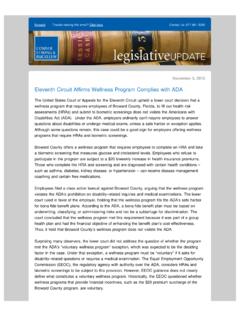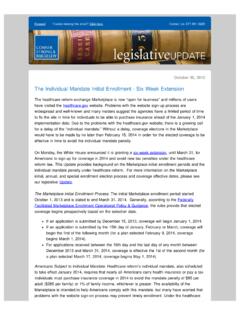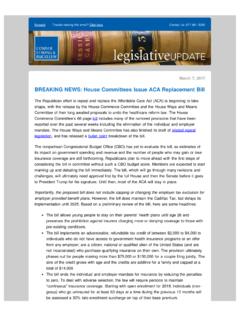Transcription of Section 125 Premium Only Plan - connerstrong.com
1 On March 22, 2010 New Jersey Gov. Chris Christie signed into law broad changes to pensions and benefits offered to public workers. This law requires that all government workers state and local contribute at least of their salaries towards the cost of their health benefits. In order to allow plan participants to pay the on a pre-tax basis, government entities will need to have set up a Premium Only Plan under Section 125 of the Internal Revenue Code (a POP ). In general, ERISA does not apply to Section 125 cafeteria (POP) plans, but it does apply to many welfare benefit plans offered under cafeteria plans. However, governmental plans as defined by ERISA 3(32) are exempt from Title I of ERISA. However, unlike the exemption under ERISA, there is no exemption for non-federal governmental cafeteria plans from the Code s requirements that apply to cafeteria plans the Code applies to such plans. As a result, such plans must follow the cafeteria plan rules, both in form (a plan document is required) and in operation.
2 We note too that while a plan document is required for a non-federal governmental cafeteria plan, no Form 5500 reporting or summary plan description (SPD) is required for a cafeteria plan. To assist in your being prepared and able to offer workers the contribution on a pre-tax basis, we have prepared a model plan document for use by public entity employers in New Jersey to assist in implementing an Internal Revenue Code Section 125 plan. The attached model document assumes that the plan year is a calendar year. Certain Articles and Sections must be customized in the attached document based upon the benefits and eligibility features of an employer. We recommend that this document and the establishment and administration of the cafeteria plan be reviewed by your legal counsel prior to its implementation as a Code Section 125 Plan. State law questions will be of particular importance and should be reviewed with an attorney versed in the applicable state law.
3 Nothing contained in the attached model document is intended to constitute legal advice regarding whether any plan or program offered by an employer constitutes an Internal Revenue Code Section 125 plan. Establishing a Section 125 POP plan will enable government workers to get tax savings on the contributions they make toward the purchase of health insurance. Thus, if a POP cafeteria plan is set up, employees can choose to reduce their salary to pay their health insurance contribution on a before tax basis. In other words, employees can choose a nontaxable benefit (health insurance contributions) instead of cash (unreduced salary). Employees can also choose between paying their health insurance contribution on a pre-tax basis under the POP plan or on an after-tax basis outside of the POP plan. An employee who chooses the after-tax route would receive his or her full salary in cash (no salary reduction election would be made under the POP plan) and make the payment for the health insurance contribution with after-tax dollars.
4 The attached model Section 125 POP plan is also written to allow for a taxable waiver payment where workers have coverage elsewhere. Under this provision, the plan provides that an employee may be paid additional (taxable) cash compensation in exchange for forgoing the (nontaxable) health insurance benefit. Conner Strong has prepared the model plan document for your convenience. If you elect to use the model document, your counsel should review it to make any adjustments or language modifications that may be necessary to meet any unique requirements that may be in place. Remember that if you do not set up a Section 125 POP you cannot offer workers the opportunity to pay the contribution on a pre-tax basis. You are also under no obligation to set up a Section 125 POP. You only need to do so if you elect to calculate the deduction on a pre-tax basis. Deducting the on a pre-tax basis reduces the employees taxable income and also the amount of employer taxes as well.
5 If you have questions regarding the attached or about a Section 125 POP, please contact your Conner Strong account representative at 1-877-861-3220. (See attached Template Section Premium Only Plan) Premium Only Section 125 Plan with Opt- Out for _____ (insert Plan Sponsor name) This document has been prepared as a model plan document to assist a public entity employer in New Jersey in implementing an Internal Revenue Code Section 125 Premium only with opt- out provision plan. The document assumes that the plan year is a calendar year. Certain Articles and Sections must be customized based upon the benefits and eligibility features of an employer. Before you adopt it (in accordance with your standard business governance procedures), you should verify its accuracy and appropriateness for your benefit programs, and your legal advisor(s) should review and approve it.
6 Nothing contained in this model document is intended to constitute legal advice regarding whether any plan or program offered by an employer constitutes an Internal Revenue Code Section 125 plan. April 2010 DRAFT ARTICLE I ESTABLISHMENT AND PURPOSE OF THE PLAN The Plan Sponsor has established the Plan for the purpose of providing those employees of the Plan Sponsor who are eligible to participate in the Plan with a choice between receiving cash (in the form of unreduced compensation or taxable benefits treated as cash) or of receiving certain Benefits under such health benefit arrangements as may be in effect for the Plan Sponsor's employees from time to time (the "Health Care Program"). In addition, the Plan offers employees who are eligible to elect the Health Care Program the right to elect to receive a taxable payment in lieu of Health Care Benefits (the Health Premium Waiver Benefit ).
7 It is the Plan Sponsor's intention that (1) the Plan qualify as a "cafeteria plan" as that term is defined in Section 125(d)(1) of the Internal Revenue Code of 1986, as amended (the "Code") and (2) the Health Care Benefits offered under the Plan qualify for exclusion from the gross income of participating employees under Code Section 125, and such other sections of the Code as may be applicable. It is also the intention of the Plan Sponsor that the Plan be interpreted in a manner consistent with the requirements of Section 125 of the Code, Treasury Regulations promulgated by the IRS thereunder, and any other requirements of the Code and/or Treasury Regulations as may be applicable in connection with the qualification for exemption from gross income of the Health Care Benefits offered under the Plan. ARTICLE II DEFINITIONS Benefit and Benefit Options means any health care benefit, including but not limited to, medical, dental, vision or similar benefits offered under the Plan.
8 Code means the Internal Revenue Code of 1986, as amended from time to time. Reference to any Section or subsection of the Code includes reference to any regulations thereunder and any comparable or succeeding provisions of any legislation which amends, supplements or replaces such Section or subsection. Compensation means remuneration paid by the Plan Sponsor that is includable in gross income, before reduction for nontaxable contributions to this Plan (or other benefit plan), not including amounts available before an Employee is eligible for the Plan. Effective Date means the date the Plan Sponsor has established the Plan for the purpose of providing those employees of the Plan Sponsor who are eligible to participate in the Plan with a choice between receiving cash (in the form of unreduced compensation or taxable benefits treated as cash) or of receiving certain Benefits under such health benefit arrangements as may be in effect for the Plan Sponsor's employees from time to time (the "Health Care Program").
9 Election Form means any appropriate election form to include electronic forms provided by the Plan Sponsor or Plan Administrator or any person providing benefits under the Plan for the purposes of electing to participate in Benefit Options and authorizing Salary Reduction Contributions to pay for such Benefit Options under the Plan. Eligible Employee means an Employee who is not an Excluded Employee. Employee means any person performing services under the direction and control of the Plan Sponsor who is either (i) currently in pay status of the Plan Sponsor, including, but not limited to, paid sick leave, paid vacation, and paid administrative leave, or (ii) on unpaid authorized leave from an Plan Sponsor. The term Employee shall not include any individuals hired to perform services for an Plan Sponsor as leased employees, agency contract personnel or independent contractors, and their respective employees or agents, notwithstanding that such individuals may be subsequently re-classified by a court, government agency, tribunal or arbitrator as common law employees of a Plan Sponsor.
10 Excluded Employee means any (i) Employee excluded from participation hereunder by the Plan Sponsor; (ii) Employee who is a member of a collective bargaining unit to which this Plan has not been extended; (iii) leased employee within the meaning of Code Section 414(n); and (iv) independent contractors or agency contract personnel; provided, however that if a leased employee, independent contractor, or contract worker is reclassified as an employee by any Federal or state agency such shall continue to be an Excluded Employee for the remainder of the Plan Year in which such reclassification determination occurs. FMLA means the Family and Medical Leave Act of 1993. FMLA Leave means a leave of absence provided to an Employee subject to and pursuant to the terms of the FMLA. Health Premium Waiver Benefit means a payment made by the Plan Sponsor on an after-tax basis to an Eligible Employee in lieu of the Eligible Employee s participation in Health Care Benefits during the Plan Year provided the Eligible Employee (i) elects to waiver his/her participation in Health Care Benefits and (ii) completes the appropriate benefits waiver forms.
